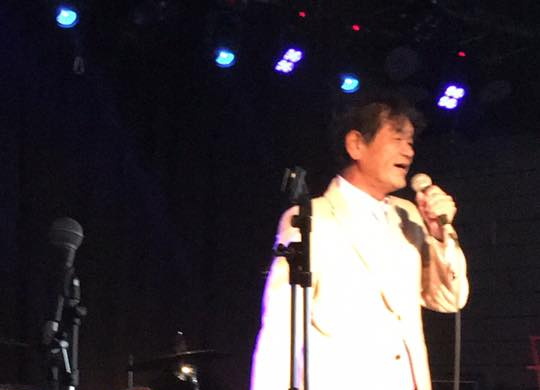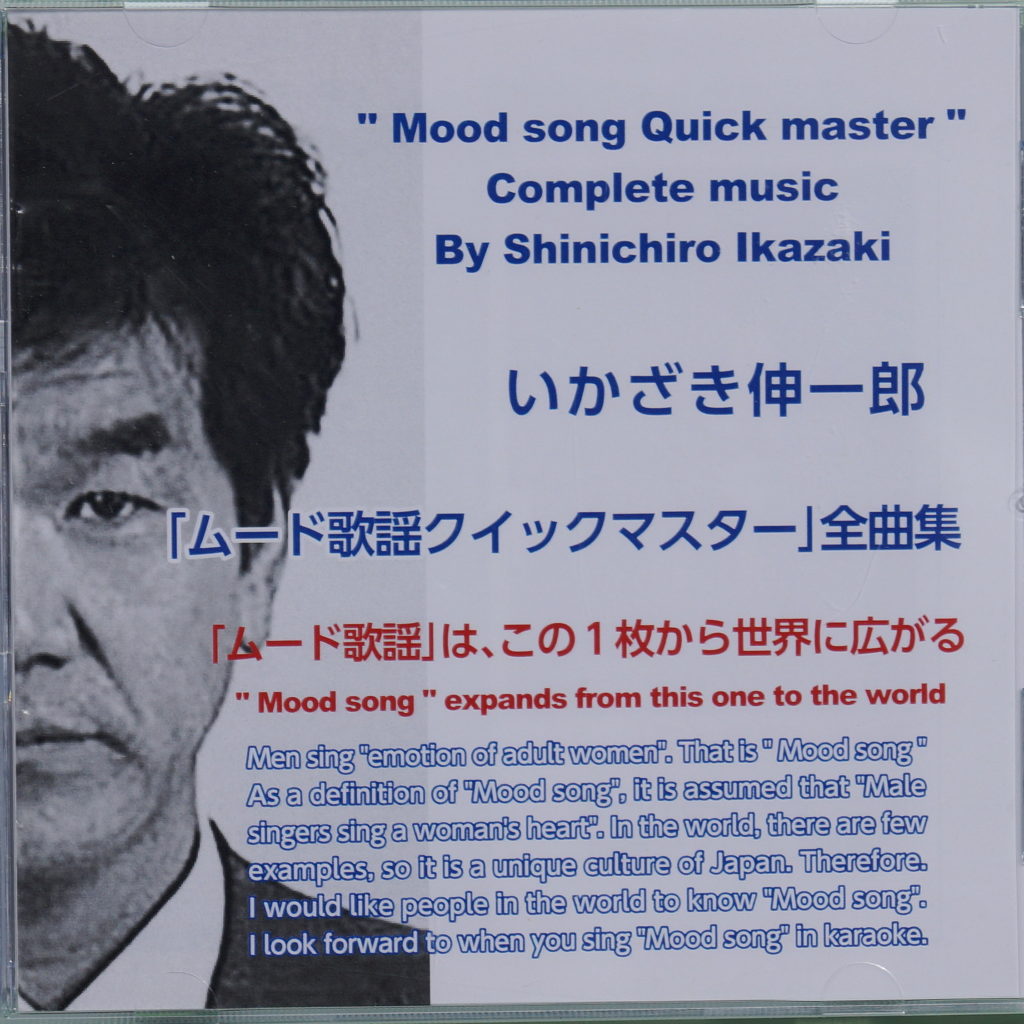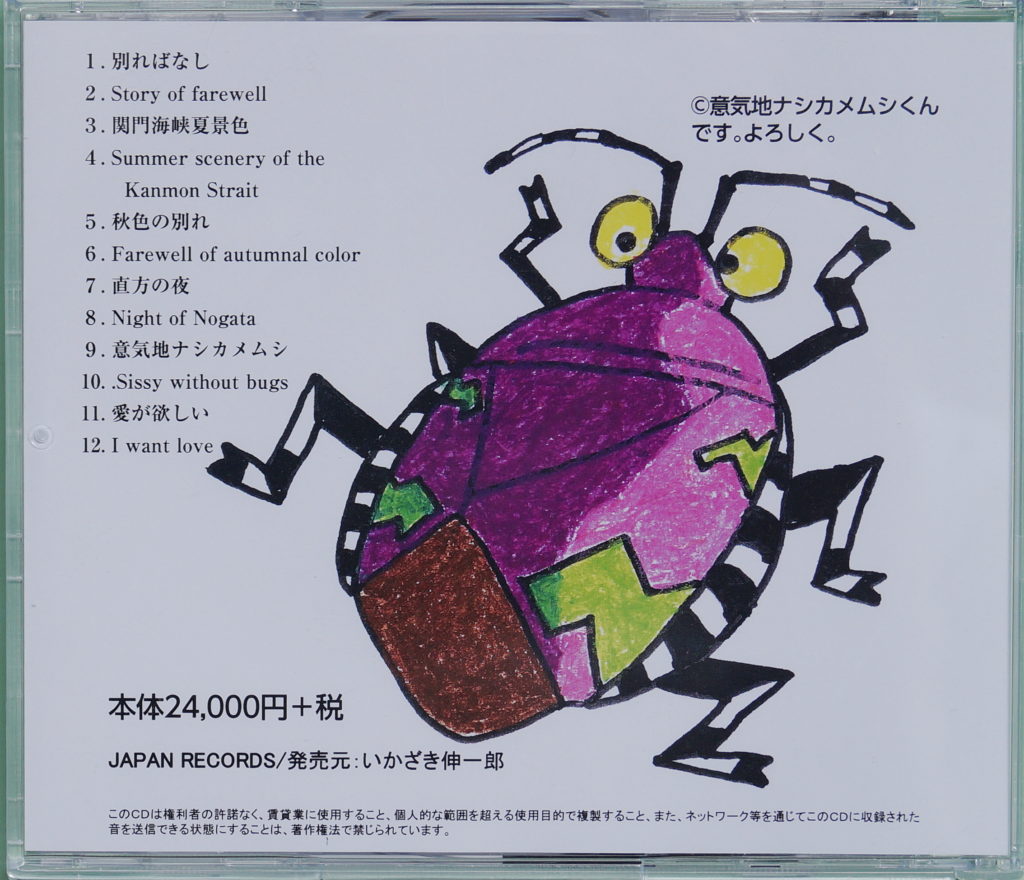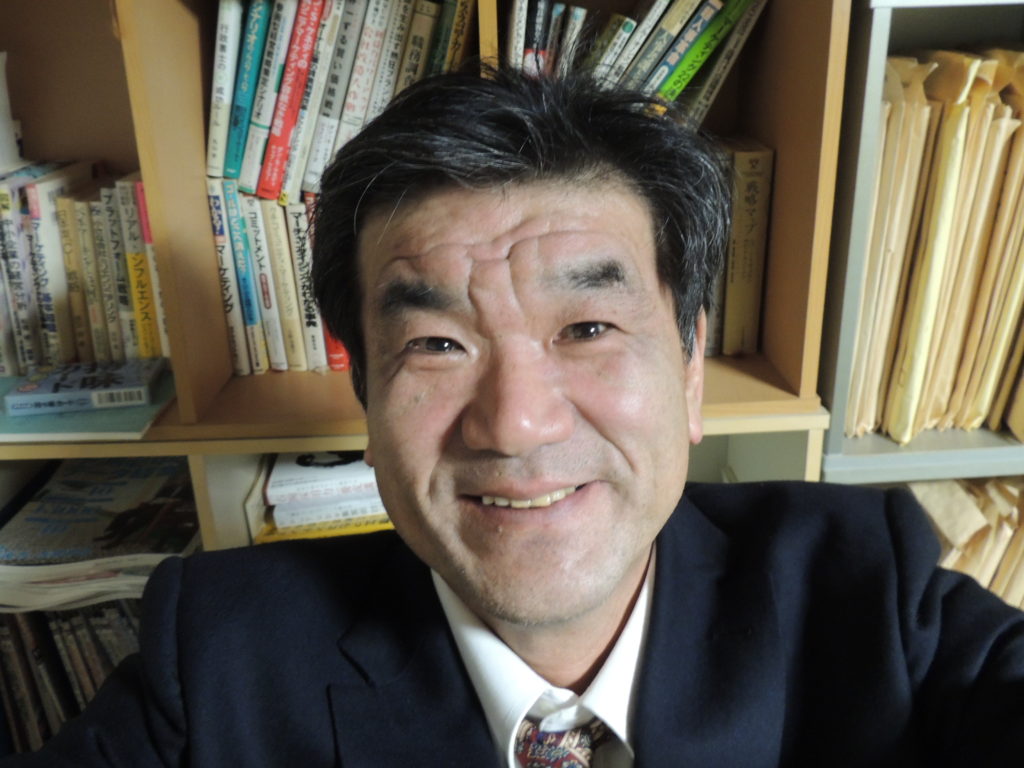
Singing with a concert 
Of course! Talk too. 
Taking insects! 
I’m working?
●ごきげんいかがですか?歌手のいかざき伸一郎です。
ムード歌謡を歌ってます。
では、さっそく聴いてください。「意気地ナシカメムシ」
●1番、(歌)「意気地ナシカメムシ」5分
●(MC)5分
(前に、付箋台を置き、スケッチブックを載せる)
(スケッチブック1枚目:「60歳から覚えてね!英単語コーナー」の文字見せながら)
ありがとうございました。(深く礼をする)
じつは私、今。英単語を覚えています。
ただ。年を取ったらダメですね。覚えることはできるのですが。その後は残念!
リアルに表現すれば、ザルで水をすくうようなもの。
せっかく覚えた英単語が、頭からザーザーとこぼれ落ちてしまいます。
Thank you very much
Actually, I am studying English words now.
However, it is not good if you get older. I can remember, but sorry afterwards!
After that, it will be disappointing.
If you express it realistically. Kind of like drawing water in a colander.
The English words that I have learned are spilled out of my head.
むかし。年表や英単語を覚えるための文書がありましたよね。
そして。一度覚えたら、忘れませんでしたよね。
そうです。そんな文書を、英単語ごとにつくればいいんです。
Old days. There were documents for memorizing chronological tables and English words.
And. Once you remember, you did not forget.
That’s right. Just create such a document for each English word.
そして。TOEICテストによく出る英単語が、手軽に覚えられるよう!
作詞家でもある私、いかざき伸一郎は、心に残るよう、英単語を作詞しました。
そして。その文書を、みなさんに紹介します。
「60歳から覚えてね!英単語」コーナー。を、開催します。お楽しみに~。
And. English words frequently used in the TOEIC test can be easily remembered!
Shinichiro Ikazaki, who is also a lyricist, wrote English words in a memorable way.
And. I will introduce that document to everyone.
The ” Japanese language course from 60 years old ” corner will be held.
Let’s looking forward to it!
では、さっそく、はじめます。
今回のテーマは、江戸時代。
(スケッチブック2枚目:江戸時代で覚える英単語」の文字見せながら)
今回は。江戸時代。です。
8月です。8×8=64。ということで。8月といえば。64(ムシ)で。虫。
おいおい!それ。おとどしも。去年もやったし。ましてや。前回も「むし」やったし。
ましてや!8がツーだから。64じゃなく。8+8=16じゃね~か?
なら。6+4+2+4=16。で。今回も「虫」にし。
おいおい!なら。1+6+3+5+(1)で。ひろみ郷~カッコいい!の方が。いいじゃね~か!そんなこと。むし虫。蒸し蒸し。無視無視。で、今回のテーマは。虫。
・・・?おいおい!ちょっと待て!今までの前置き。なんか。聞いたことあるな~。前にやったことあるだろ~。ネタ切れか?・・・。そうですね。川崎さん。なら。今までの前置き。
むし虫。蒸し蒸し。無視無視。で。8月といえば。エイト。エイトマン!でなく。江戸。
今回のテーマは。江戸時代。です。それで。え~ど。と言うよりも。どうでも。え~ど。
お江戸日本橋 ごまみそ ずい♪ あみんよ~。でなく。民謡の「お江戸日本橋♪」
よかったですね・・・・かげろうお銀の入浴シーン。ジャンジャン。
おいおい!ちょっと待て!由美かおるさんのミニスカート。じゃ~ね~んかよ。ましてや!歌詞ちがうし。お江戸日本橋 七ツ立ち♪だし。ジャンジャン。
江戸時代。約270年間。明治時代から令和の今までは。約150年。だから。かなり長く続いた時代ですね。ただ。江戸時代。は「元号」でなく。軽く言えば。「江戸」が。日本の中心の時代。そう考えれば。「明治」からは。東京時代。いやいや。江戸時代が。まだまだ続いている。のかもしれません。平安時代よりも。長い時代になりますね。ジャンジャン。
ジャンジャン。じゃ~あ~りません!今回は。ネタ切らすし。歌詞まちがえるし。最近は。前置き長いし。歌短いし。なのに。急に!まじめなことゆうな!なにをゆ~早見優。
そんな。クレームまじりの気分で英単語を覚えましょう!
では。まずは、こちら。
So, let’s get started.
The theme this time is. Let’s learn Japanese with “Edo Period”.
It’s August. 8 x 8 = 64. So. Speaking of August. 64 (musi). in short. Insect.
Wait a minute. insect. You did that theme the year before last and last year. Furthermore, you did “insects” last time as well. Furthermore, 8 is two. Not 64. Isn’t 8 + 8 = 16? Then. 6 + 4 + 2 + 4 = 16. so. Let’s make it “insect” again this time. Not to mention. At 1 + 6 + 3 + 5 + (1). Hiromi Go ~ Cool! is better than that. Such a thing. Insect and insect. Hot and humid. Ignore Ignore. so. The theme this time is Insect.
…? Wait a minute. Wait a minute~! Introduction so far. Something. I’ve heard of it. You’ve done it before. Are you out of ideas? …. I agree. Mr. Kawasaki. in that case. Introduction so far. Insect and insect. Hot and humid. Ignore Ignore. so. Speaking of August. Eight. Eight man! not. Edo. The theme this time is “Edo period”. That’s fine. rather than saying. I don’t care.
Oedo nippombashi gomamiso zui♪ Folk song “Oedo Nihonbashi♪”.
It was good!・・The bathing scene of Kagero Ogin. Jean Jean.
Wait a minute. Wait a minute~! Isn’t Ms. Kaoru Yumi’s miniskirt good? Furthermore, Wrong lyrics. Oedo nippombashi nanatsudachi♪That’s the correct. Jean Jean.
Edo Period. About 270 years. It has been about 150 years from the Meiji era to the Reiwa era. Therefore, the Edo period was a period that lasted quite a long time. However, the Edo period was not an era name, but rather an era in which “Edo” was the center of Japan. If you think about it, the Meiji era is the Tokyo era. No no. The Edo period may be still continued. It will be longer than the Heian period. Jean Jean.
Jean Jean. No, no! This time, You ran out of material. And you got the lyrics wrong. Recently. It’s a long introduction. The song is short. Nevertheless, suddenly! you don’t say serious thing Yuuna! What do you say Yuu Hayami.
With such complaints. Let’s learn Japanese words with that feeling!
So. OK. First, here.
(スケッチブック6枚目:「下記の単語を書いた」の文字見せながら)
Almost+動詞
危うく~ところだ
オールモウスト ドウシ。危うく~ところだ。という意味です。
はい。では。なぞかけのノリでいきますね。
オールモウスト ドウシ。とかけて。危うく~ところだ。と解く。その心は。
Almost+V. Ayauku~tokoroda. That means.
Yes. OK. I do it in a next way.
Almost+V.Tokakete. Ayauku~tokoroda. Totoku. Sonokokorowa.
(スケッチブック7枚目:「下記の言葉を書いた」の文字見せながら)
新撰組がおる申すと同志。危うく斬られるところだ
尊王攘夷・討幕運動の志士たちですね。池田屋事件が。有名ですね。
はい。続いて。
Shinsengumiga orumosuto doshi. ayauku kirareru tokoroda.
They are the patriots of the reverence for the king and the anti-shogunate movement. The Ikedaya Incident is well known.
Yes. continue.
(スケッチブック8枚目:「下記の単語を書いた」の文字見せながら)
Argue that
異議を唱える、主張する
アーギュザット。異議を唱える、主張する。という意味ですね。
アーギュザット。とかけて。異議を唱える。と解く。その心は。
Argue that. Igiwotonaeru, Shuchosuru.That means.
Argue that. Tokakete. Igiwotonaeru. Totoku. Sonokokorowa.
(スケッチブック9枚目:「下記の言葉を書いた」の文字見せながら)
裏柳生(やあぎゅう)、ザッと斬る!刀で異議を唱える子連れ狼
しとしとぴっちゃん♪ですね。たしか?乳母車に。機関銃がついてました。
はい。ではつぎ。
Urayagyu(yaagyu), zatto kiru!katanade igiwotonaeru kozureokami.
It’s Shitoshito Pitchan ♪. Perhaps? The stroller had a machine gun.
Yes. Next.
(スケッチブック10枚:「下記の単語を書いた」の文字見せながら)
Argument
討議、主張
アーギゥメント。討議、主張。という意味ですね。
アーギゥメント。とかけて。討議。と解く。その心は。
Argument. Togi, Shucho. That means.
Argument. Tokakete. Togi. Totoku. Sonokokorowa.
(スケッチブック11枚:「下記の言葉を書いた」の文字見せながら)
剣でなく、裏柳生(やあぎゅう)、面と向かって、子連れ狼と討議する
そんなシーンは。あ~りません!面と向かって、剣で勝負!
はい。つぎ。
Kendenaku, urayagyu(yaagyu), mentomukatte, kozureokamito togisuru.
There is no such scene! Fight face to face with a sword!
Yes. OK.
(スケッチブック12枚:「下記の単語を書いた」の文字見せながら)
As a sign of A
Aの証として
アズアサインオブ。Aの証として。という意味ですね。
アズアサインオブ。とかけて。Aの証として。と解く。その心は。
As a sign of A.A no akashitoshite. That means.
As a sign of A. Tokakete. A no akashitoshite. Totoku. Sonokokorowa.
(スケッチブック13枚:「下記の言葉を書いた」の文字見せながら)
「あざ」サインオブ若様。若様の証としての「あざ」
「あ!このあざは!・・・若様にちがいありません!」。時代劇で。よくあるシーンですね。
はい。では。
「aza」sain obu wakasama. wakasama no akashitoshiteno「aza」.
“Ah! This bruise! It must be a young lord!” It’s a common scene in period dramas.
Yes. OK.
(スケッチブック14枚:「下記の単語を書いた」の文字見せながら)
At all time
常に、いつも
アットオールタイム。常に、いつも。という意味です。
アットオールタイム。とかけて。いつも。と解く。その心は。
At all time. Tsuneni, Itsumo. That means.
OK. At all time. Tokakete. Itsumo. Totoku. Sonokokorowa.
(スケッチブック15枚:「下記の言葉を書いた」の文字見せながら)
いつも、後、お~るたい、武者の霊
背後霊。ですね。一緒に!写真に写ったりします。
はい。では、つぎ。
Itsumo, ato, o~rutai, mushano rei.
It’s the ghost behind. We will be photographed together.
Yes. Then, next.
(スケッチブック16枚:「下記の単語を書いた」の文字見せながら)
Cage
かご、おり。
ケイジ。かご、おり。という意味です。
では。ケイジ。とかけて。かご。と解く。その心は。
Cage. Kago, Ori. That means.
Cage. Tokakete. Kago. Totoku. Sonokokorowa.
(スケッチブック17枚:「下記の言葉を書いた」の文字見せながら)
かごに乗って、行けい!ジィー
ジィー。走っては。行けませ~ん。年だから。
はい。では。
Kagoni notte, ikei!ji.
Gee can’t run. because he is old.
Yes. OK.
(スケッチブック18枚:「下記の単語を書いた」の文字見せながら)
Dawn
夜明け、明ける。
ドーン。夜明け、明ける。という意味です。
ドーン。とかけて。夜明け。と解く。その心は。
Dawn. Yoake, Akeru. That means.
Dawn. Tokakete. Yoake. Totoku. Sonokokorowa.
(スケッチブック19枚:「下記の言葉を書いた」の文字見せながら)
西郷ど~ん!日本の夜明けじゃ
なんか。有名なシーン。ですね。でも。誰が言ったのでしょう?
はい。では、こちら。
Saigodo~n!nihonno yoakeja.
It’s a famous scene. But who said that?
Yes. Then here.
(スケッチブック20枚:「下記の単語を書いた」の文字見せながら)
Enormously
多大に、莫大に
イノーマスリィ。多大に、莫大に。という意味です。
イノーマスリィ。とかけて。莫大に。と解く。その心は。
Enormously. Meaning. Tadaini, Bakudaini.
Enormously. Tokakete. Bakudaini. Totoku. Sonokokorowa.
(スケッチブック21枚:「下記の言葉を書いた」の文字見せながら)
伊能~、またスリ歩きながら、莫大に測量する
伊能忠敬さん。ですね。股を。スったかどうか?わかりませんが。スったと思います。
はい。では、こちらの。
Ino~, matasuri arukinagara, bakudaini sokuryosuru.
He is Mr.Tadataka Ino. Did he cut his crotch? don’t understand. I think he did.
Yes. Then here.
(スケッチブック22枚:「下記の単語を書いた」の文字見せながら)
Hard to get
ゲットするのが難しい
ハードツーゲット。意味は。ゲットするのが難しい。
ハードツーゲット。とかけて。ゲットするのが難しい。と解く。その心は。
Hard to get. Gettosurunoga muzukashii. That means.
Hard to get. Tokakete. Gettosurunoga muzukashii. Totoku. Sonokokorowa.
(スケッチブック23枚:「下記の言葉を書いた」の文字見せながら)
ゲットするのが難しい関所だが、黄門様は、道中ゲット!
「かっかっかっ」。さすが。黄門様。ジャンジャン。
Gettosurunoga muzukashii sekishodaga, komonsamaha, dochu getto!
“Kakakka”. As expected of Komon-sama. Jean Jean.
Then the last.
(スケッチブック24枚:「下記の単語を書いた」の文字見せながら)
Hostile
敵意を持った、敵対的
ホスタイル。敵意を持った、敵対的。という意味です。
ホスタイル。とかけて。敵意を持った。と解く。その心は。
Hostile. Tekiiwo motta, Tekitaiteki. That means.
Hostile. Tokakete. Tekiiwo motta. Totoku. Sonokokorowa.
(スケッチブック25枚:「下記の言葉を書いた」の文字見せながら)
外国人に敵意を持った武士はすたる
日本の夜明けじゃ~。は同時に。武士の日暮れじゃ~。やはりここで。江戸時代の終わりじゃ~。ジャンジャン。
はい。では。最後に。一句。
Gaikokujinni tekiiwo motta bushiha sutaru.
“It’s the dawn of Japan” is at the same time “It’s the sunset of the samurai.” After all, The end of the Edo period were that time. Jean Jean.
Yes. OK. Finally. A phrase.
(スケッチブック26枚目:「下記の句」の文字見せながら)
英単語 スモッグ、お~ガスと 夏景色
子供の頃。スモッグガス。と言ってたと思います。そして。大都会、東京(ここは江戸でなく。東京でえ~ど)。の夏を思い出します。「光化学スモッグの日」。7月18日の記念日。らしいです。何の記念か?わかりませんが。ジャンジャン。
これで。あなたの頭と心に。しっかりと残りました。
と、いうことで。
Smog occurs is the summer scenery of Tokyo.
I think I used to call it “smog gas” when I was a kid. At the same time. I remember summer in the big city of Tokyo (this is not Edo, but Tokyo). “Photochemical Smog Day”. It seems to be the anniversary of July 18th. I don’t know what someone are commemorating. Jean Jean.
Yes, with this. On your head and heart. It remained firmly.
Yes. OK.
「60歳から覚えてね!英単語コーナー」でした。
次回も。お楽しみに!ジャンジャン!
ありがとうございました。(深く礼をする)
では、聴いてください。「直方の夜」
” Let’s learn Japanese from 60! No.82 ” is over.
Next time. Let’s looking forward to it! Jean Jean!
Thank you very much (I bow deeply)
Then, please listen. ” Night of Nogata “
●2番、(歌) 「直方の夜」 5分
●ありがとうございました。(深く礼をする)
